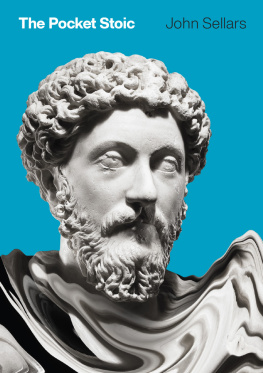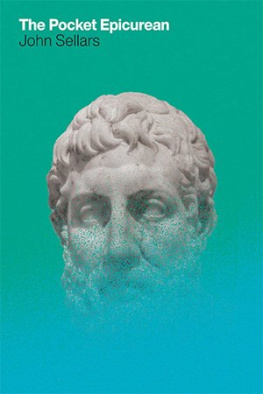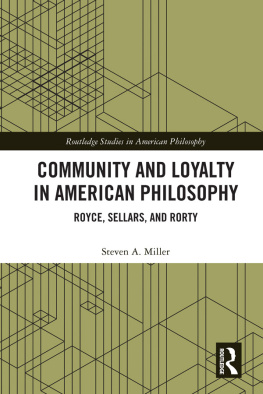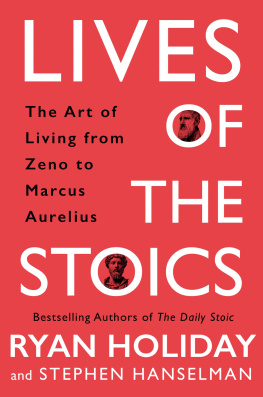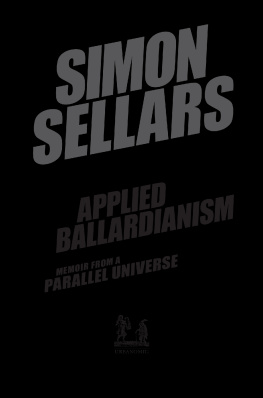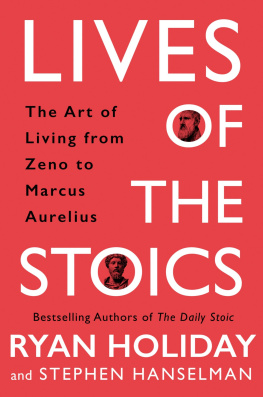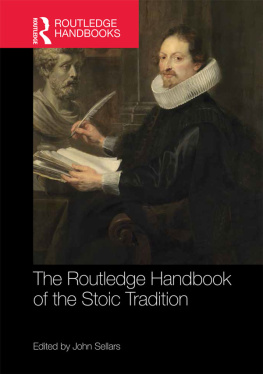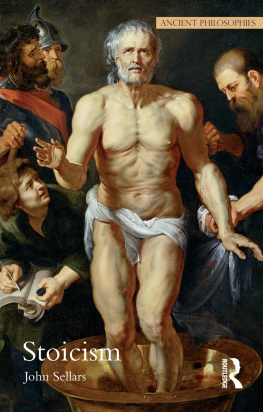John Sellars - The Art of Living: The Stoics on the Nature and Function of Philosophy
Here you can read online John Sellars - The Art of Living: The Stoics on the Nature and Function of Philosophy full text of the book (entire story) in english for free. Download pdf and epub, get meaning, cover and reviews about this ebook. year: 2009, publisher: Bloomsbury Academic, genre: Religion. Description of the work, (preface) as well as reviews are available. Best literature library LitArk.com created for fans of good reading and offers a wide selection of genres:
Romance novel
Science fiction
Adventure
Detective
Science
History
Home and family
Prose
Art
Politics
Computer
Non-fiction
Religion
Business
Children
Humor
Choose a favorite category and find really read worthwhile books. Enjoy immersion in the world of imagination, feel the emotions of the characters or learn something new for yourself, make an fascinating discovery.

- Book:The Art of Living: The Stoics on the Nature and Function of Philosophy
- Author:
- Publisher:Bloomsbury Academic
- Genre:
- Year:2009
- Rating:5 / 5
- Favourites:Add to favourites
- Your mark:
- 100
- 1
- 2
- 3
- 4
- 5
The Art of Living: The Stoics on the Nature and Function of Philosophy: summary, description and annotation
We offer to read an annotation, description, summary or preface (depends on what the author of the book "The Art of Living: The Stoics on the Nature and Function of Philosophy" wrote himself). If you haven't found the necessary information about the book — write in the comments, we will try to find it.
The Art of Living: The Stoics on the Nature and Function of Philosophy — read online for free the complete book (whole text) full work
Below is the text of the book, divided by pages. System saving the place of the last page read, allows you to conveniently read the book "The Art of Living: The Stoics on the Nature and Function of Philosophy" online for free, without having to search again every time where you left off. Put a bookmark, and you can go to the page where you finished reading at any time.
Font size:
Interval:
Bookmark:
The Stoics on the Nature
and Function of
Philosophy
John Sellars

Bloomsbury Academic
An imprint of Bloomsbury Publishing Plc
50 Bedford Square | 1385 Broadway |
London | New York |
WC1B 3DP | NY 10018 |
UK | USA |
www.bloomsbury.com
First published in 2003 by Bristol Classical Press an imprint of
Gerald Duckworth & Co. Ltd.
This Edition 2009
John Sellers 2003
John Sellers has asserted his right under the Copyright, Designs and
Patents Act, 1988, to be identified as Author of this work.
All rights reserved. No part of this publication may be reproduced or
transmitted in any form or by any means, electronic or mechanical,
including photocopying, recording, or any information storage or
retrieval system, without prior permission in writing
from the publishers.
No responsibility for loss caused to any individual or organization acting on
or refraining from action as a result of the material in this publication
can be accepted by Bloomsbury or the author.
British Library Cataloguing-in-Publication Data
A catalogue record for this book is available from the British Library.
eISBN-13: 978-1-4725-2112-5
Library of Congress Cataloging-in-Publication Data
A catalog record for this book is available from the Library of Congress.
Typeset by John Sellers
I am delighted that Duckworth is publishing this paperback edition of The Art of Living, first published in hardback by Ashgate in 2003. I am especially pleased that it will take its place alongside the many respected volumes already published in the Bristol Classical Paperbacks series. My hope, of course, is that it will now reach a much wider audience than it has thus far.
The first edition received a number of careful and thorough reviews that brought to light both issues about which I might have said more and places where I might have been clearer. This new preface gives me the welcome opportunity to address some of the comments that have been made.
As a number of reviewers have noted, this book can be taken on two levels.
This attempt to undercut the assumption that the distinction I draw maps onto the analytic-continental division not only failed in its task for one reviewer but also created a problem for another. This reviewer accused me of setting up Bernard Williams as a straw man. The occasional remarks by Williams that I cite in the Introduction certainly do not do justice to the full range of his reflections on the nature and role of philosophy.
Another philosopher who turned away from the scientistic image of philosophy towards a humanistic one was Isaiah Berlin.
It has been suggested that although I claim to remain impartial with regard to the two different conceptions of philosophy I outline (see While I am clearly attracted to the idea that philosophy be conceived as an art of living, I would like to restate that I do not hold that this is the correct, proper, true, or only way in which philosophy might be conceived. I do not hold that other conceptions of philosophy are inevitably misguided, confused, or false. Instead I should like to propose what I shall call metaphilosophical pluralism. Drawing an analogy with Isaiah Berlins value pluralism, which holds that there exist a number of equally objective but ultimately incommensurable values, I advocate a metaphilosophical pluralism in which there may exist a number of equally justifiable but incompatible conceptions of what philosophy is, and there are no definitive grounds for ruling that any one of these conceptions deserves to be given priority. My account of philosophy as an art of living is offered as a contribution to this metaphilosophical pluralism rather than an attempt to legislate dogmatically on what philosophy is or should be.
I should also like to stress that the idea that philosophy is concerned with ones way of life should not be assumed to imply that practical concerns outweigh a commitment to truth. Instead it combines a commitment to truth with the claim that that commitment is not merely theoretical but will also have real-world consequences. A contrast is sometimes drawn between analytic philosophy committed to truth and knowledge and populist forms of philosophy serving up moral or spiritual improvement or chicken soup for the soul.not identical to it. One might reject that thesis while remaining committed to the view that a philosophical pursuit of truth and knowledge will have an impact upon and express itself in ones way of life.
Having dealt with some of the issues arising out of the metaphilosophical side of the book it is now time to turn to its historical side. This is the more substantial side and I suspect that the majority of readers will be more interested in ancient Stoicism than abstract metaphilosophy. Yet it is worth stressing the metaphilosophy in order to keep in focus the nature of the claims I make about Stoicism. One reviewer has greeted the volume as a contribution to the literature on Stoic practical ethics, while another has lamented that it fails as a contribution to the literature on Stoic moral theory. This book does not attempt to add to the ever-expanding body of work on Stoic moral theory either, which is just one of these six parts, but rather to reconstruct the metaphilosophical architecture within which such moral theory finds its home.
One of the central figures in my account of the nature of Stoic philosophy is Epictetus. It has been suggested that my account of Epictetus understanding of philosophy does not do full justice to some passages in which he seems to hold an intellectualist conception of virtue.its own assumes that the theoretical principles underpinning an art or craft will on their own constitute knowledge. In other words, it assumes that philosophical knowledge should be identified with mastery of philosophical doctrines. But in what I take to be a key passage (Diss. 1.15.2; key because it is the only explicit definition of philosophy he offers us) Epictetus does not conceive philosophical knowledge in this way. Because he conceives philosophy as an art or craft, philosophical knowledge will require both mastery of philosophical doctrines and a subsequent period of training or exercise designed to digest those doctrines, just as mastery of other arts and crafts do. However, Epictetus can remain a Socratic intellectualist while holding this conception of philosophical knowledge for like Socrates he can then argue that once one does have philosophical knowledge (conceived in this way as knowledge of a craft) then it will necessarily transform ones behaviour. In those passages where Epictetus suggests that correct beliefs or judgements ( ) are enough, I would argue that we understand these as instances of craft-type knowledge.
) are enough, I would argue that we understand these as instances of craft-type knowledge.
In order to bring the central issues into focus my analysis may at times appear too blunt, especially with regard to the division between theoretical arguments and practical exercises. that rhetoric is of far less relevance to the conceptual analysis of the nature of philosophy of the sort that I am engaged in here.
Another reviewer locates a central issue in the book as the attempt to respond to the competing characterizations of ancient philosophy by Pierre Hadot and Michel Foucault (see esp. pp. 115-18). If this is the case then I am happy to acknowledge it.
Font size:
Interval:
Bookmark:
Similar books «The Art of Living: The Stoics on the Nature and Function of Philosophy»
Look at similar books to The Art of Living: The Stoics on the Nature and Function of Philosophy. We have selected literature similar in name and meaning in the hope of providing readers with more options to find new, interesting, not yet read works.
Discussion, reviews of the book The Art of Living: The Stoics on the Nature and Function of Philosophy and just readers' own opinions. Leave your comments, write what you think about the work, its meaning or the main characters. Specify what exactly you liked and what you didn't like, and why you think so.


